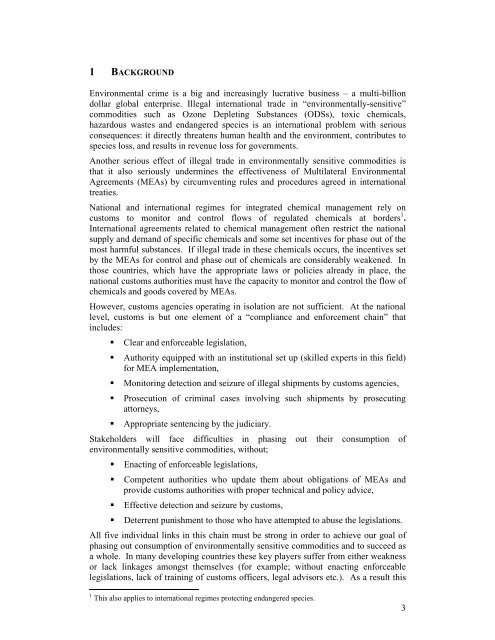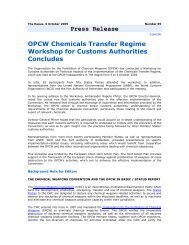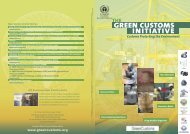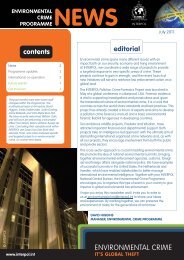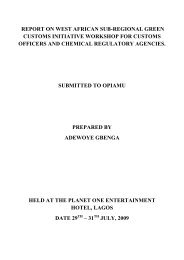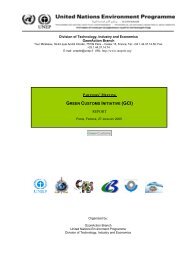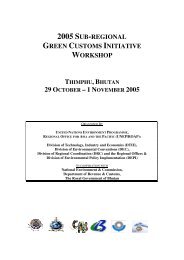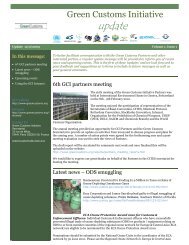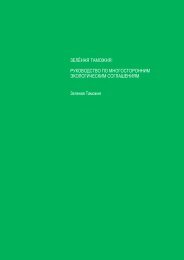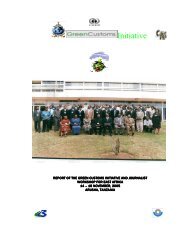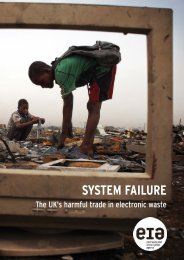Tbilisi - Green Customs Initiative
Tbilisi - Green Customs Initiative
Tbilisi - Green Customs Initiative
Create successful ePaper yourself
Turn your PDF publications into a flip-book with our unique Google optimized e-Paper software.
1 BACKGROUNDEnvironmental crime is a big and increasingly lucrative business – a multi-billiondollar global enterprise. Illegal international trade in “environmentally-sensitive”commodities such as Ozone Depleting Substances (ODSs), toxic chemicals,hazardous wastes and endangered species is an international problem with seriousconsequences: it directly threatens human health and the environment, contributes tospecies loss, and results in revenue loss for governments.Another serious effect of illegal trade in environmentally sensitive commodities isthat it also seriously undermines the effectiveness of Multilateral EnvironmentalAgreements (MEAs) by circumventing rules and procedures agreed in internationaltreaties.National and international regimes for integrated chemical management rely oncustoms to monitor and control flows of regulated chemicals at borders 1 .International agreements related to chemical management often restrict the nationalsupply and demand of specific chemicals and some set incentives for phase out of themost harmful substances. If illegal trade in these chemicals occurs, the incentives setby the MEAs for control and phase out of chemicals are considerably weakened. Inthose countries, which have the appropriate laws or policies already in place, thenational customs authorities must have the capacity to monitor and control the flow ofchemicals and goods covered by MEAs.However, customs agencies operating in isolation are not sufficient. At the nationallevel, customs is but one element of a “compliance and enforcement chain” thatincludes:Clear and enforceable legislation,Authority equipped with an institutional set up (skilled experts in this field)for MEA implementation,Monitoring detection and seizure of illegal shipments by customs agencies,Prosecution of criminal cases involving such shipments by prosecutingattorneys,Appropriate sentencing by the judiciary.Stakeholders will face difficulties in phasing out their consumption ofenvironmentally sensitive commodities, without;Enacting of enforceable legislations,Competent authorities who update them about obligations of MEAs andprovide customs authorities with proper technical and policy advice,Effective detection and seizure by customs,Deterrent punishment to those who have attempted to abuse the legislations.All five individual links in this chain must be strong in order to achieve our goal ofphasing out consumption of environmentally sensitive commodities and to succeed asa whole. In many developing countries these key players suffer from either weaknessor lack linkages amongst themselves (for example; without enacting enforceablelegislations, lack of training of customs officers, legal advisors etc.). As a result this1 This also applies to international regimes protecting endangered species.3


